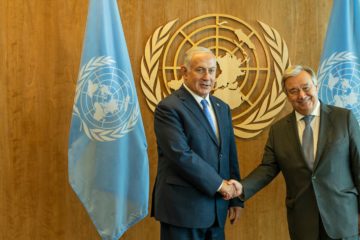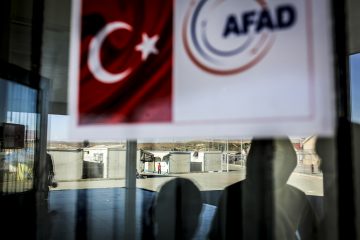
ISRAEL AND IRAN: WHAT NEXT?
With this month’s direct military strikes against each other, a war between Israel and Iran becomes not only conceivable but a growing risk. For all Israel’s advantages and determination, with the most sophisticated military in the region and an innovative and resilient economy, it is a small country of less than ten million people. Iran is a large country of over 80 million people whose economy and military capabilities have survived years of crippling sanctions. The outcome would depend on who had the strongest external support. For the time being, Israel has firm international friends and allies, as Iranian diplomats recognise. But that international support is under strain from the Israeli government’s refusal to consider any negotiations with the Palestinians …

Chaos by Design: The Dehumanising Nature of US Aid Airdropped into Gaza
Since October 7, Israel has blocked most food, water, hygiene items, and medicine from entering Gaza. The government has denied access to aid agencies, security inspections have deliberately slowed the entry of trucks, communication blackouts have cut off internet and phone services to more than two million residents, and Israeli protesters have lined up to block humanitarian aid supplies. Moreover, the US, UK, and other donors suspended funding to UNRWA, the UN’s aid agency for Palestine, after Israel accused staff members of participating in the October 7 attacks and called for the organisation to be disbanded. Crucially, these accusations have not been proven. As a result, people in Gaza are starving. Sixteen children, and counting, have died of malnutrition, UN …

Israel’s Strategic Dilemma
Debate in Israel about the government’s strategy in the Gaza war is heating up. While a majority of Israelis still support the war in Gaza, a growing minority are questioning whether continuing the war against Hamas will bring greater security to Israel or stability to the region, arguing that the government’s military campaign will perpetuate a conflict damaging all parties – not least Israelis themselves. Benjamin Netanyahu’s failure to bring home the Israeli hostages has reinforced tensions and doubt among the public. But continuing the war suits the incumbent government, enabling them to remain in power. Paradoxically, it also suits Hamas. Only when a majority of Israelis themselves conclude that the current strategy puts at risk rather than guarantees their …

Jihad in the City: Militant Islamism and Contentious Politics in Tripoli- Author’s Q&A
We interviewed Raphaël Lefèvre about his new book Jihad in the City: Militant Islamism and Contentious Politics in Tripoli, available now. OxPol: What motivated you write your book? Raphaël Lefèvre: I wanted to shed light on a little-known historical event with large contemporary echo: the creation by a militant Islamist movement of an “Islamic Emirate” on the city of Tripoli, Lebanon in 1982-1985. This movement has modern parallels with the “Islamic Caliphate” created by ISIS in parts of Iraq and Syria after 2014 and with similar attempts by Al-Qaeda to create “Islamic Emirates” on the territories it has sporadically controlled recently, from Southern Yemen and Northern Mali to Northern Syria. I am not suggesting that the 1982-1985 “Islamic Emirate” in Tripoli …

‘Uniting for Peace’ Against Israel’s Annexation Plan
With the diversion of Israel’s military resources towards West Bank, Israeli annexation of occupied Palestinian territory appears imminent, pending approval from and coordination with the American administration. Struggling to rally right-wing voters amidst the fight for his political survival in the elections of April, September 2019 and March 2020, Prime Minister Benjamin Netanyahu had stated that he would “apply Israeli sovereignty” over the West Bank, if re-elected. Bolstered by the reversal of decades of American policy on the issue and the subsequent release of Trump’s much criticized, one-sided ‘Middle East Peace Plan’ in January 2020, Netanyahu has aggressively pursued the annexation agenda with the emergency government formed with Benny Gantz in March 2020. Considering the expected blockage of the Security …
Lebanon in Free Fall: It May Get Worse Before It Gets Better
In October 2019, demonstrators took to the streets of Lebanon, chanting “all of them means all of them”— a cry for the entire government to resign. For the first time in years, the country witnessed the mobilisation of thousands of its citizens across every city. There were even Lebanese protests in major European cities and North America. Together, they formed a united front: citizens coming together regardless of religious affiliation, gender or age differences. Four months after the protests began, the country’s institutions are in shambles, a financial crisis worsens, and the media is in a near-total blackout. Unfortunately, Western attention has turned away from Lebanon. The situation, though, still warrants careful observation, as what happens next could mean a …
A Contrarian View of Turkey’s Incursion into Northern Syria
Global attention has focused on the Middle East once more after Turkey launched a military operation, named Peace Spring, moving into Northern Syria. The incursion was made possible by the prior withdrawal of US troops. Beforehand, there was little outwardly indication of the troubles to come: Daesh’s territory was conquered and the US and Turkey cooperated in the region. However, everything started to fall apart after the phone call between President Erdogan and President Trump, in which he agreed to withdraw US troops from Northern Syria, became public. Since then, commentators have criticized President Trump’s decision to withdraw, and Turkey’s actions and intentions. It has been claimed that Turkey is solely motivated by its conflict with Kurdish forces, who have …

Syrian Refugees in Turkey: How Will Political Events Determine Their Future?
In contemporary world politics, migration and refugee crises are among the most heartrending and vexatious issues. Syria represents one of the most significant humanitarian crises and disasters of our time. Since the conflict has started in 2011, thousands of civilians have been killed, and millions have been forced to flee from their homeland. Since its outbreak, civil war and terrorism have forced millions of people to seek refuge in neighboring countries, including Turkey, Jordan, Egypt and elsewhere. The massive inflow of refugees from Syria makes Turkey the largest host country for Syrian refugees in the region, and the country hosting most refugees in the world in absolute terms. Even though many Syrian refugees currently reside in refugee camps, the vast …









